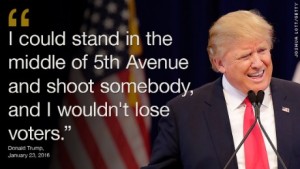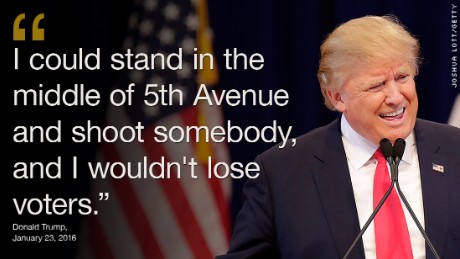We all like to think the world is a meritocracy, where hard work is important and results matter.
As we watched Mitt Romney, and others, frontally assault Donald Trump this week it was clear they were saying Mr. Trump is not the right person to be President. They are pointing out his use of bankruptcies to protect his personal wealth, while leaving investors holding the empty bag. And his flip-flopping on various issues, including how he would deploy military forces. And his use of misogynistic language against women, while simultaneously referring to most Mexicans and lawbreakers and all Muslims as terrorists, are gross generalities they say are not supported by facts.
Yet, while many sober-minded leaders are denouncing Mr. Trump, it is not clear that it matters. His followers seem to remain passionately loyal, and completely unmoved by any factual representation of their candidate as anything other than a savior for America. The “Super Saturday” delegate selection resulted in Mr. Trump winning 2 more contests (Louisiana and Kentucky) while coming in second in 2 others (Kansas and Maine.) And it demonstrated the ongoing pattern of Mr. Trump winning the popular vote in primaries.
Everyone remembers a situation where a very hard working, smart, industrious person did things well for years. But they weren’t promoted, or even given large pay increases. Or, worse, they made one mistake and lost their position, or job.
Simultaneously, we all also can think of at least one, or more, person who simply wasn’t that good, and often didn’t work that hard, but was promoted (often beyond their competency) and given large pay increases. And every time this person made a mistake it was explained away as a “learning experience” that would make them a better future performer. They were blessed with continuous upward mobility, and could seemingly do no wrong.
For each of us these experiences seemed unique, and we often tied them to the specific individuals involved – including not only the person at the center of these experiences but their superiors, subordinates and peers. And many people are saying the political rise of Donald Trump is unique to him and the current state of his political party.
But rather than each being unique, these experiences all have something in common. The actual frequency of these experiences belies the notion that they are all unique. Rather, what all of these demonstrate is the implementation of selective bias. They demonstrate that very often we prefer people because they reinforce our bias, and their past results do not matter.
Bosses who promote incompetency don’t really care about the competency as much as they care that the individual reinforces their inherent Beliefs, Interpretations, Assumptions and Strategies about the world. There is often a familial, geographic, academic, business relationship, religious or gender trait (or often multiple traits) which reinforces in these bosses that their view of the world is right, and should be promoted.
This may be due to the person being very much similar to the boss. But, not always. It just requires that the target be a visible, walking, talking implementation of how they think the world works. Whether or not the person is successful really does not matter. If they are different from the boss’s viewpoint, no success will be great enough to have the boss support them. If they fulfill the boss’s bias then they often can do no wrong.
 Donald Trump has been leading his candidate competitors not because he was wildly successful. Rather, he is attracting a larger group of people who identify with him; who share his basic Beliefs, Interpretations of the world, Assumptions about how people behave, and Strategies for how to succeed. They share his bias, and thus they select him. As Mr. Trump said himself “I could stand in the middle of 5th Avenue and shoot somebody and I wouldn’t lose voters.”
Donald Trump has been leading his candidate competitors not because he was wildly successful. Rather, he is attracting a larger group of people who identify with him; who share his basic Beliefs, Interpretations of the world, Assumptions about how people behave, and Strategies for how to succeed. They share his bias, and thus they select him. As Mr. Trump said himself “I could stand in the middle of 5th Avenue and shoot somebody and I wouldn’t lose voters.”
Regardless of the robustness of the American economy and the ongoing growth in jobs creation, they Believe America is in terrible shape, and that almost all media participants are liars. No matter what the truth is about the value of immigrants on the economy, they Interpret all immigrants as job-stealing bad people that have made their lives worse. No matter the truth about the spirit of Islam and the goodness of Muslims, they Assume all of them terrorists out to blow up the world. And they agree with Strategies like stopping immigrants with walls, killing civilian Muslims as collateral damage in a religious war, torturing prisoners of war (possibly to death,) eliminating international trade, and depriving poor people of health care and other services.
Thus, selective bias ties these voters to Mr. Trump with a bind that is not breakable by discussing his performance, or pointing out his failings. Facts are not relevant. Their judgement is not based on historical facts, but rather a clear alignment with their bias. No matter who says Mr. Trump may have lied, or exaggerated, or misinterpreted history that messenger will not be believed. Because the real results don’t matter. What matters is reinforcing their bias.
Unfortunately we see this selective bias all too often in business. Leaders that favor some over others simply because of bias, rather than results. It has long been a problem which has restricted diversity in the workforce, and inhibited equal pay. It has long created a caste system for admission to top schools and places of employment. And because selective bias is so rampant in American business, it is second nature to Mr. Trump. It is easy for him to say what is on his mind, and expect that lots of people will agree with him. It’s how he sees the world, it is his bias, and he’s used to having it reinforced by those who wish to work with him.
Whatever happens in this Presidential campaign, as business leaders we can learn from this situation that if we allow selective bias to sway us then we are no longer really paying attention to results. As leaders which of the following should be important – promoting those who reinforce our beliefs, interpretations, assumptions and strategies, or finding the best people to do the job and rewarding those who really have worked hard for good results?


Excellent piece Adam. This can be copy-pasted to any political party anywhere in the world these days.